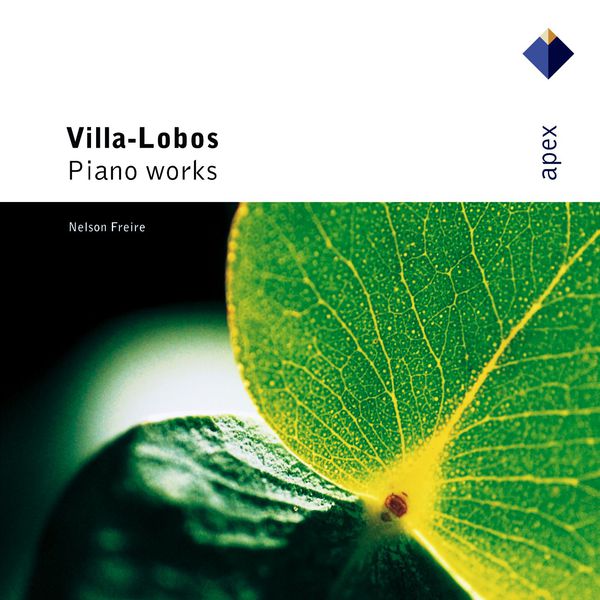
Streaming illimitato
Ascolta subito questo album in alta qualità sulle nostre app
Inizia il mio periodo di prova e riproduci l'albumGoditi questo album sulle app Qobuz con il tuo abbonamento
AbbonatiGoditi questo album sulle app Qobuz con il tuo abbonamento
Download digitale
Acquista e scarica questo album in più formati, secondo le tue esigenze.
Heitor Villa-Lobos’ Rudepoêma is one of a small number of piano works known for their insurmountable technical difficulty. Composed for Arthur Rubinstein, who played it for the first time in 1927, the Rudepoêma is often considered as the Brazilian composer’s masterpiece. Long, dense and eccentric, it has discouraged more than one performer. “It takes a lumberjack's strength,” wrote Rémi Jacobs, "bronze hands and an ogre's appetite to ingest and reproduce this music.” Its title evokes savagery, of course, but it also incorporates the nickname “Rudi,” which Villa-Lobos affectionately gave to Rubinstein.
This album is entirely dedicated to Heitor Villa-Lobos and was recorded in 1973 in Berlin by his compatriot Nelson Freire, who was as inseparable from Brazil as was the great composer who died in 1959. Passionate about Villa-Lobos' music, Nelson Freire played it throughout his career, making it an essential part of his concerts and recordings.
This superb anthology brings together pieces from many different periods and styles, and Nelson Freire colours each piece with incredible bravery and exhilarating technical assertiveness. It includes A prole do bebê, deceptively childish and delightful pieces inspired as much by Ravel as by Poulenc, the Prelude to Bachianas Brasileiras No. 4, solemn and respectful of Bach's style, which is neither plagiarised nor mocked, and the Três Marias, three witty bagatelles.
All of these, to a certain extent, light pieces obviously offer an astonishing contrast to Rudepoêma, which is the pièce de résistance at the end of this album. © François Hudry/Qobuz
Al momento stai ascoltando degli estratti.
Ascolta oltre 100 milioni di brani con un abbonamento streaming illimitato.
Ascolta questa playlist e più di 100 milioni di brani con i nostri abbonamenti di streaming illimitato
A partire da 12,49€/mese

HEITOR VILLA-LOBOS (1887-1959), Composer - Nelson Freire, Piano, MainArtist
© 2003 Warner Classics, Warner Music UK ℗ 1974 Teldec Classics International GMBH
HEITOR VILLA-LOBOS (1887-1959), Composer - Nelson Freire, Piano, MainArtist
© 2003 Warner Classics, Warner Music UK ℗ 1974 Teldec Classics International GMBH
HEITOR VILLA-LOBOS (1887-1959), Composer - Nelson Freire, Piano, MainArtist
© 2003 Warner Classics, Warner Music UK ℗ 1974 Teldec Classics International GMBH
HEITOR VILLA-LOBOS (1887-1959), Composer - Nelson Freire, Piano, MainArtist
© 2003 Warner Classics, Warner Music UK ℗ 1974 Teldec Classics International GMBH
HEITOR VILLA-LOBOS (1887-1959), Composer - Nelson Freire, Piano, MainArtist
© 2003 Warner Classics, Warner Music UK ℗ 1974 Teldec Classics International GMBH
HEITOR VILLA-LOBOS (1887-1959), Composer - Nelson Freire, Piano, MainArtist
© 2003 Warner Classics, Warner Music UK ℗ 1974 Teldec Classics International GMBH
HEITOR VILLA-LOBOS (1887-1959), Composer - Nelson Freire, Piano, MainArtist
© 2003 Warner Classics, Warner Music UK ℗ 1974 Teldec Classics International GMBH
HEITOR VILLA-LOBOS (1887-1959), Composer - Nelson Freire, Piano, MainArtist
© 2003 Warner Classics, Warner Music UK ℗ 1974 Teldec Classics International GMBH
HEITOR VILLA-LOBOS (1887-1959), Composer - Nelson Freire, Piano, MainArtist
© 2003 Warner Classics, Warner Music UK ℗ 1974 Teldec Classics International GMBH
HEITOR VILLA-LOBOS (1887-1959), Composer - Nelson Freire, Piano, MainArtist
© 2003 Warner Classics, Warner Music UK ℗ 1974 Teldec Classics International GMBH
HEITOR VILLA-LOBOS (1887-1959), Composer - Nelson Freire, Piano, MainArtist
© 2003 Warner Classics, Warner Music UK ℗ 1974 Teldec Classics International GMBH
Approfondimenti
Heitor Villa-Lobos’ Rudepoêma is one of a small number of piano works known for their insurmountable technical difficulty. Composed for Arthur Rubinstein, who played it for the first time in 1927, the Rudepoêma is often considered as the Brazilian composer’s masterpiece. Long, dense and eccentric, it has discouraged more than one performer. “It takes a lumberjack's strength,” wrote Rémi Jacobs, "bronze hands and an ogre's appetite to ingest and reproduce this music.” Its title evokes savagery, of course, but it also incorporates the nickname “Rudi,” which Villa-Lobos affectionately gave to Rubinstein.
This album is entirely dedicated to Heitor Villa-Lobos and was recorded in 1973 in Berlin by his compatriot Nelson Freire, who was as inseparable from Brazil as was the great composer who died in 1959. Passionate about Villa-Lobos' music, Nelson Freire played it throughout his career, making it an essential part of his concerts and recordings.
This superb anthology brings together pieces from many different periods and styles, and Nelson Freire colours each piece with incredible bravery and exhilarating technical assertiveness. It includes A prole do bebê, deceptively childish and delightful pieces inspired as much by Ravel as by Poulenc, the Prelude to Bachianas Brasileiras No. 4, solemn and respectful of Bach's style, which is neither plagiarised nor mocked, and the Três Marias, three witty bagatelles.
All of these, to a certain extent, light pieces obviously offer an astonishing contrast to Rudepoêma, which is the pièce de résistance at the end of this album. © François Hudry/Qobuz
A proposito dell'album
- 1 disco(i) - 11 traccia(e)
- Durata totale: 00:40:11
- Artisti principali: Nelson Freire
- Compositore: Heitor Villa-Lobos
- Etichetta: Warner Classics International
- Genere: Classica
© 2003 Warner Classics, Warner Music UK ℗ 1974 Teldec Classics International GMBH
Migliorare le informazioni sugli album
 Perché acquistare su Qobuz
Perché acquistare su Qobuz
-
Ascolta la tua musica in streaming o download
Acquista un album o una singola traccia. Oppure ascolta il nostro intero catalogo con i nostri abbonamenti streaming illimitati di alta qualità.
-
Zero DRM
I file scaricati ti appartengono, senza limiti d’uso. Puoi scaricarli tutte le volte che vuoi.
-
Scegli il formato più adatto a te
Scarica i tuoi acquisti in un'ampia varietà di formati (FLAC, ALAC, WAV, AIF ...) a seconda delle tue esigenze.
-
Ascolta i tuoi acquisti sulle nostre app
Scarica le app Qobuz per smartphone, tablet e computer e ascolta i tuoi acquisti dappertutto.


